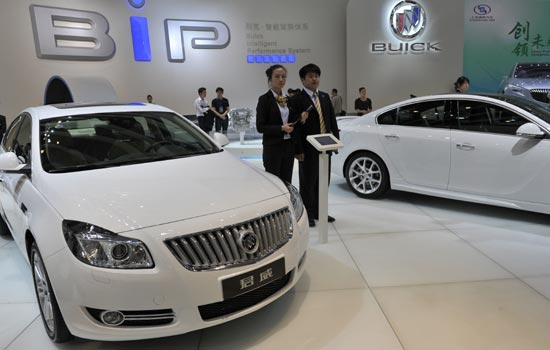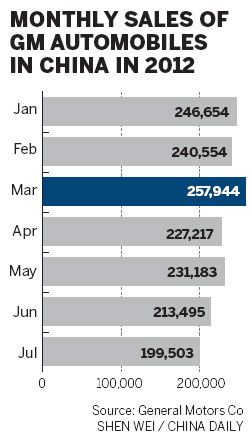
|
 |
|
General Motor Co's Buick booth at the Beijing International Auto Show in April. The US automaker sold 199,503 vehicles in China in July, a 15.1 percent year-on-year increase. [Photo/China Daily] |
But curbs to limit car purchases may slam brakes on industry
General Motors, the largest foreign automaker in China measured by sales, reported record monthly sales numbers for the sixth consecutive time.
But a growing national trend to limit automobile ownership locally looms as a possible hindrance to sales in the future.
The US automaker said on Monday that it set a July record by delivering 199,503 vehicles in China, a 15.1 percent increase from last year's previous high for the month. It was the sixth such report General Motors has made since February.
Shanghai GM's sales in China rose 5.7 percent on an annual basis to a July record of 97,064 units. SAIC-GM-Wuling's sales reached 98,694 units, an all-time high for July and an increase of 26.6 percent year-on-year.
FAW-GM's sales were up 3.1 percent to 3,379 units, the US auto company said.
For the first seven months of 2012, sales by General Motors and its joint ventures in China were up 11.7 percent on an annual basis to 1.62 million units, surpassing last year's record for the period.
Kevin Wale, president and managing director of the General Motors China Group, said last month that General Motors expected sales increases to remain steady in the second half, driven by demand in China's interior provinces, as demand for its products in all important segments are strong despite signs of slowing economic growth in China.
General Motors' strong market performance showed strong monthly sales in July around the country, just as Rao Da, secretary-general of China Passenger Car Association, predicted.
"Domestic sales in July will be similar with the number in June, which will speed up the recovery of China's passenger vehicle market over the coming months," Rao said.

However, China's still-growing automobile market is facing difficulties as more major cities are launching strict policies to limit the number of vehicles in response to traffic and environmental concerns.
Guangzhou recently became the fourth city to limit car purchases by restricting vehicle registrations, following Beijing, Shanghai and Guiyang, in Guizhou province.
Analysts said the vehicle purchase limits in Guangzhou won't seriously affect the local market in the short term, but will inspire more cities to follow suit.
Xi'an, capital city of Shaanxi province and one of the fastest-growing vehicle market in China, said last week that it is considering putting caps on automobile sales as it issued a traffic policy draft to collect public opinions.
Dong Yang, general secretary of the China Association of Automobile Manufacturers, strongly disagreed with the local governments' sales curbs.
"The policies go against the central government's appeal for China's stable growing economy, and it's unfair to citizens who don't yet have their first car," Dong said.
Statistics show that Beijing's sales cap, which started in December 2010, has lowered the national vehicle sales growth rate by 3 percentage points.
"If other big cities, like Hangzhou, Tianjin, and Nanjing all follow suit, China's vehicle market will stop growing in the coming years," said Jia Xinguang, an auto analyst in Beijing.
lifangfang@chinadaily.com.cn